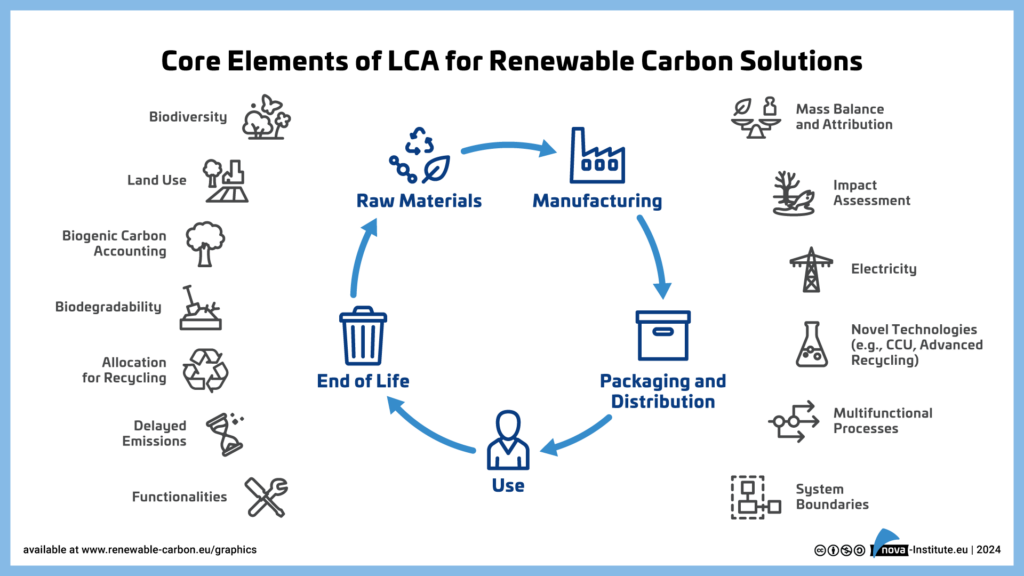The Renewable Carbon Initiative (RCI) has released a comprehensive study analysing the provisions of Life Cycle Assessment (LCA) and carbon footprint standards in relation to renewable carbon sources, i.e. carbon from biomass, carbon capture or recycling. Conducted by nova-Institute on behalf of RCI, the study provides a comparative evaluation of how major sustainability frameworks approach methodological choices, highlighting key areas of agreement and divergence.
Life Cycle Assessment (LCA) is widely recognised as the standard methodology for evaluating the environmental impact of products and materials. However, its complexity and methodological variability pose challenges for policy implementation and industrial application. With renewable carbon-based solutions emerging as a key alternative to fossil-based materials, understanding the provisions of existing LCA frameworks is essential to ensure fair and transparent sustainability assessments. This is of particular relevance for innovative solutions competing with established systems like it is often the case for renewable carbon-based products in competition to their fossil counterparts – for example because of higher scrutiny on new solutions, methodological aspects that have not been considered or established yet, different levels of data quality and economies of scale.
The study is published in three reports: report 1 (146 pages) evaluates methodological choices which impact LCAs for products containing renewable carbon in existing LCA frameworks and guidelines. The study specifically examines the similarities and differences in the methodological choices (for elements depicted in Figure 1) of guidelines, as well as the implications of these methodological aspects on the LCA outcomes. The frameworks were selected based on their relevance and legitimacy in the industry, academia and policy field, and include: ISO 14040/44, ISO 14067, GHG Protocol Product Standard, PACT’s Pathfinder Framework, the PCF Guideline for the chemical industry by Together for Sustainability (TfS), EPD for the construction industry – ISO 14025 and EN 15804, the Renewable Energy Directive, the Product Environmental Footprint (PEF) and the JRC’s plastics LCA methodology. One field with a particularly large methodological freedom is recycling. Therefore, in report 2 (36 pages) a special focus is given to renewable carbon in recycling situations and challenges for LCA and carbon footprint studies. Report 3, a non-technical summary (15 pages) highlights the main insights of the project results and states Key take-aways for policy-makers.

The study shows both alignment and notable differences between frameworks – the assessed frameworks agree on methodological approach of many aspects, but there are also some critical differences:
Consensus areas: Most frameworks agree on the method to assess the impacts of biogenic carbon uptake and emissions (except for PEF and RED). While the specific provisions regarding recycling differ, all of the analysed frameworks leave multiple options available so that the variety of results is large for each of them.
Areas of Divergence: On the other hand, the analysed frameworks differ regarding the provisions for processes with multiple outputs and the question whether the avoided production of co-products can be taken into account with a credit (system expansion with substitution). The provisions range from only vague requirements for the application of substitution, to strict requirements, to a complete prohibition of substitution in the carbon footprint result.
Policy-makers should recognise the documented methodological flexibility in LCA frameworks to help ensure a level playing field for renewable carbon compared to fossil carbon sources. While the analysed frameworks have different levels of flexibility, LCA results can vary strongly even within calculation results under the same framework. Simply following a certain framework does not guarantee that LCA results are comparable.
Biogenic carbon accounting should enable -1/+1: When it comes to biogenic carbon accounting, almost all frameworks require to use the -1/+1-approach, where biogenic CO2 uptake is modelled as negative GHG emissions and biogenic CO2 emissions are modelled as (positive) GHG emissions. Only PEF and RED III use the 0/0- (or net zero-)approach, where any biogenic removal and emission count towards the GHG emissions with 0, although it should be noted that a change from 0/0 to -1/+1 is being discussed in the EF Technical Advisory Board.
Further clarifications needed: Several methodological aspects should be further discussed and clarified, best case through involvement of relevant stakeholders from the LCA community, industry, policy-makers (JRC), etc. This applies especially for Mass Balance and Attribution and CCU.
The latest RCI study provides critical insights into the current landscape of LCA and carbon footprint standards as they relate to renewable carbon. This analysis serves as a valuable resource for industry stakeholders, policymakers and LCA practitioners seeking to navigate the complexity of LCA in the context of renewable carbon.
As the transition towards a more circular carbon economy accelerates, the insights from this study can support shaping future LCA methodologies and informed decision-making across industries and policy domains.
For more information on the study and its implications, please click here or contact christopher.vomberg@nova-institut.de.
Disclaimer
RCI members are a diverse group of companies addressing the challenges of the transition to renewable carbon with different approaches. The opinions expressed in these publications may not reflect the exact individual policies and views of all RCI members.
About RCI
The Renewable Carbon Initiative (RCI) is a global network of more than 60 prominent companies dedicated to supporting and accelerating the transition from fossil carbon to renewable carbon (bio-based, CO2-based and recycled) for all organic chemicals and materials. Its work focuses on scientific background reports, position papers, advocacy and networking.
Find all press releases of the Renewable Carbon Initiative (RCI), visuals and more free-for-press purposes at www.renewable-carbon-initiative.com/media/press
Source
Renewable Carbon Initiative, press release, 2025-03-12.
Supplier
Renewable Carbon Initiative (RCI)
Share
Renewable Carbon News – Daily Newsletter
Subscribe to our daily email newsletter – the world's leading newsletter on renewable materials and chemicals









